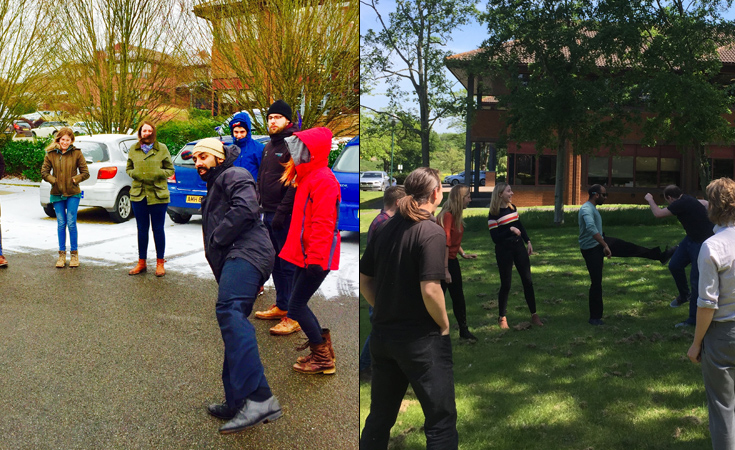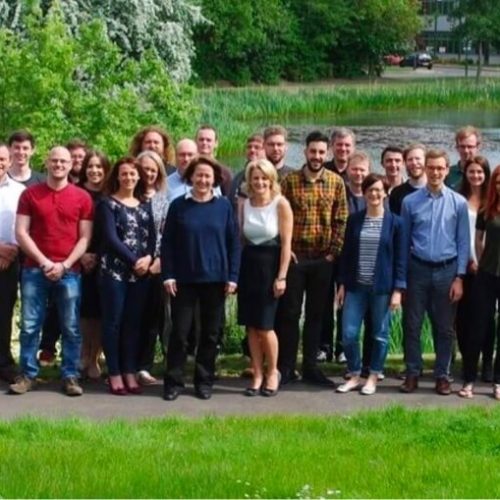One in four people experiences a mental health issue in any given year, and one in six employees is depressed, anxious or suffering from stress-related problems at any one time. These are the estimates from a Labour Force Survey on ‘Health and Safety Statistics for Great Britain’ (Health and Safety Executive, 2015). Mental ill health is common, and the causes are complex and unique to each person. In addition, work can trigger or aggravate some of these issues. So how does an environmental consultancy tackle these issues and support its employees?
As a responsible employer, the mental health and well-being of our teams here at Thomson are taken very seriously. Our workforce is diverse, and we have many people out of the office in all weathers at sites across the country and travelling long distances. It is important therefore to make sure that they feel supported and cared for in the workplace.
Here are just a few of the initiatives that we have in place to help reduce workplace stress, improve mental health and encourage any of our employees to seek help if they are struggling.
Mental Health First Aiders
A mental health first aider is a suitably trained person in the workplace that is available, without notice, to speak with someone who may be experiencing the symptoms of mental ill health or feeling that an existing condition is worsening.
Six staff from across Thomson’s offices have been through training with Mental Health First Aid (MHFA) England to become qualified mental health first aiders. The two-day course covers issues that people can face, helps the First Aiders to recognise the symptoms of potential mental health problems and looks at the best ways for people to work through and overcome them.
Mental health first aiders are given the training to offer initial support and then signpost people towards available resources or professional advice, if necessary. In some situations, line manager involvement could be useful in adapting day-to-day work-life balance. By having trained staff on hand, and supportive line-managers, the aim is to promote well-being at work and support good mental health.
“I have spoken with a few people since going through the course and feel I have helped steer them to getting further assistance with medical professionals and groups that are able to provide suitable support.” – Wulf, Mental Health First Aider at Thomson.
MHFA have found that if people who are experiencing the early symptoms of mental ill health feel able to talk about them – particularly in the workplace – it helps prevent the problem escalating into something more serious.
At Thomson, we place importance on the fact staff know that it’s okay to talk about mental health and that the company is willing to make reasonable adjustments to help them do their job.
Education

According to New Economics Foundation research, learning provides the right stimulus to help ease symptoms of mental ill-health. On-going education at work is key in how we do things and not only do our many internal and external training courses help people develop their skills and careers but hopefully help them to enjoy their work experience and boost their confidence.
From tree identification all the way through to water vole mitigation, and everything in between, Thomson offers employees over 20 internal training courses. Each course is different in its delivery. Some are conducted through e-learning, others are field or classroom-based.
We are also proud to share that we have successfully delivered our first Leadership Development Programme, which was aimed at growing our leadership capability in-house. The programme, consisting of classroom sessions with internal and external speakers, online training, reading, and real projects on in-house issues, not only helped our team enhance their existing leadership and management skills, but also offered some helpful practical skills that enhanced their confidence and self-awareness as leaders. At the beginning of the programme, our senior leadership team acted as mentors to each member of the team, providing guidance and support, as well as sharing their tips and tricks.
Flexible working

For many people it is important that they can balance work responsibilities around personal commitments. In order to meet the needs of many different staff, flexibility can help ease the pressure of a range of issues including family commitments, study opportunities or simply work-life balance.
By allowing its staff to work the hours they need to between the office and home, a business demonstrates trust and in return, the obligation is that the work gets done on time. Flexibility is key for us as a company, allowing us to scale our workforce up and down as required.
We have a clear flexible working policy that is available to all employees. Our junior ecologists are often employed during our busiest period over the summer and then choose to go travelling during the winter months when the intensive field resource work tends to be quieter. They then pick up with us again the following season, something that works well for both parties and allows them the freedom to pursue their own life experiences if they want to.
Be social

Exercise is a well-known strategy for helping to reduce stress and aid mental well-being. Time away from your desk at some point in the day is important, even if it’s just a walk around the block or a lunchtime fitness class. Discounted gym memberships and organised outdoor adventures and activities are also great for encouraging staff to be sociable and making them more active and engaged with their work and colleagues.
We have groups that have tackled challenges such as the Yorkshire Three Peaks Challenge or have taken part in beach cleans. In our Guildford office, we have a lunchtime tradition of a game of hacky-sac. This outdoor team game involves passing a rice filled hacky-sac around the group with the objective of completing as many moves as possible, using no hands. This is inclusive of all departments in the business, helps de-stress by getting people outdoors, and can help improve working relationships and bonds in the workplace.
More intermittent activities include regular 5-a-side football involving members from multiple teams across the company, and several paid-for parties across the year, where everyone can let their hair down, or up – depending on the occasion or theme.
So far, so good
These tips certainly help us to maintain a healthy workforce, in body and mind, with positive impacts on retention, and of course productivity. If you run a business or are a part of an organisation that you think could improve the well-being of its staff, we hope that these ideas have inspired you.
“Even by the very fact the company has invested in getting Mental Health First Aid in place, it immediately takes some weight off people’s minds knowing that if they need to, there is always someone there they can approach.” – Tom, Thomson employee.











